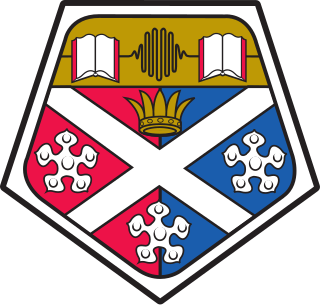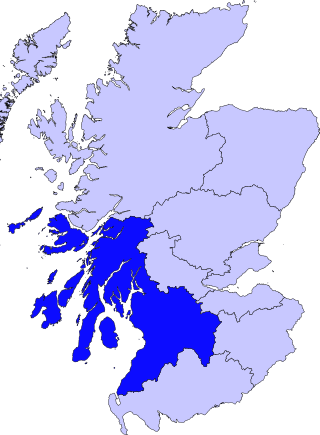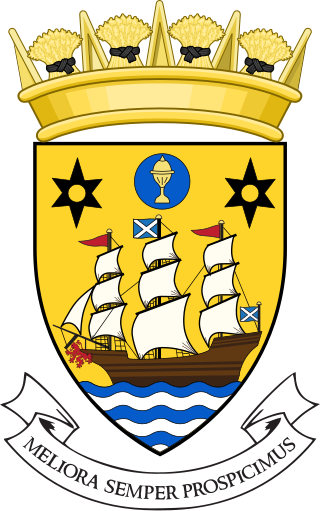
The University of Strathclyde is a public research university located in Glasgow,Scotland. Founded in 1796 as the Andersonian Institute,it is Glasgow's second-oldest university,having received its royal charter in 1964 as the first technological university in the United Kingdom. Taking its name from the historic Kingdom of Strathclyde,its combined enrollment of 25,000 undergraduate and graduate students ranks it Scotland's third-largest university,drawn with its staff from over 100 countries.

Strathclyde was one of nine former local government regions of Scotland created in 1975 by the Local Government (Scotland) Act 1973 and abolished in 1996 by the Local Government etc. (Scotland) Act 1994. The Strathclyde region had 19 districts. The region was named after the early medieval Kingdom of Strathclyde centred on Govan,but covered a broader geographic area than its namesake.

Unionism in Scotland is a political movement which favours the continuation of the political union between Scotland and the other countries of the United Kingdom,and hence is opposed to Scottish independence. Scotland is one of four countries of the United Kingdom which has its own devolved government and Scottish Parliament,as well as representation in the UK Parliament. There are many strands of political Unionism in Scotland,some of which have ties to Unionism and Loyalism in Northern Ireland. The two main political parties in the UK —the Conservatives and Labour —both support Scotland remaining part of the UK.
A devolved English parliament is a proposed institution that would give separate decision-making powers to representatives for voters in England,similar to the representation given by the Senedd,the Scottish Parliament and the Northern Ireland Assembly. A devolved English parliament is an issue in the politics of the United Kingdom.

Inverclyde Council is one of the 32 local authorities of Scotland,covering the Inverclyde council area. In its current form the council was created in 1996,replacing the previous Inverclyde District Council which existed from 1975 to 1996.

The 2007 United Kingdom local elections were held on Thursday 3 May 2007. These elections took place in most of England and all of Scotland. There were no local government elections in Wales though the Welsh Assembly had a general election on the same day. There were no local government elections in Northern Ireland. Just over half of English councils and almost all the Scottish councils began the counts on Friday,rather than Thursday night,because of more complex arrangements regarding postal votes.
Susan Fiona Dorinthea Michie is a British academic,clinical psychologist,and professor of health psychology,director of The Centre for Behaviour Change and head of The Health Psychology Research Group,all at University College London. She is also an advisor to the British Government via the SAGE advisory group on matters concerning behavioural compliance with government regulations during the COVID-19 pandemic. In 2022,she was appointed Chair of the World Health Organisation’s (WHO) Technical Advisory Group on Behavioural Insights and Sciences for Health.

Richard Rose is a political scientist,author,and academic whose comparative studies in social science have significantly influenced political science and public policy in both practice and theory. He is a Professor and Director of the Centre for the Study of Public Policy at the University of Strathclyde (UOS) in Scotland,and is a Visiting Fellow at the Robert Schuman Centre of the European University Institute and the WZB Berlin Social Science Center.

Since 1922,the United Kingdom has been made up of four countries:England,Scotland,Wales and Northern Ireland. The UK prime minister's website has used the phrase "countries within a country" to describe the United Kingdom.

Pippa Norris is a British American political scientist specializing in comparative politics. She is the McGuire Lecturer in Comparative Politics at the Harvard Kennedy School at Harvard University,and she has served as the Australian Laureate Fellow and Professor of Government and International Relations at the University of Sydney,and Director of the Electoral Integrity Project.

Michael Steed was a British psephologist,political scientist,broadcaster,activist and Liberal Democrat politician. He wrote extensively on political parties and elections.

John Peter Scott is an English sociologist working on issues of economic and political sociology,social stratification,the history of sociology,and social network analysis. He is currently working independently,and has previously worked at the Universities of Strathclyde,Leicester,Essex,and Plymouth. He is a Fellow of the British Academy,a Fellow of the Royal Society of Arts,and a Fellow of the Academy of Social Sciences. He has been a member of the British Sociological Association since 1970. In 2015 he became Chair of Section S4 of the British Academy. In 2016 he was awarded an Honorary Doctorate of Essex University.
Anthony Francis Heath,CBE,FBA is a British sociologist who is a professor of sociology at Oxford University and a professorial fellow of Nuffield College,Oxford.
Ian McAllister FASSA FRSE is the Distinguished Professor of political science at the Australian National University. He earned his PhD in political science in 1976 from University of Strathclyde. He is a leading election specialist with a research focus on Australian politics which involves co-directing the Australian Election Study,a national survey of political opinion conducted after each federal election since 1987 at the Australian National University. He is a leading scholar in individual level political survey research.
This page lists the public opinion polls that were conducted in relation to the 2014 Scottish independence referendum,that was held on 18 September 2014. Overall,polls showed that support for a "No" vote was dominant until the end of August 2014,when support for a "Yes" vote gained momentum and the gap closed significantly,with at least one poll placing the "Yes" vote ahead. In the final week of the campaign,polls showed the "No" vote to be consistently but somewhat narrowly ahead. There were no exit polls although a YouGov post-election poll was published shortly after the polls closed. For the history of the campaign itself see 2014 Scottish independence referendum,Yes Scotland,and Better Together (campaign).
Alan Alexander is a Scottish academic,writer and public servant. He was General Secretary of the Royal Society of Edinburgh 2013 -2018.
David Firth is a British statistician. He is Emeritus Professor in the Department of Statistics at the University of Warwick.
Jane Green FAcSS is a British political scientist and academic. She is Professor of Political Science and British Politics at the University of Oxford and a professorial fellow of Nuffield College. She is a specialist in public opinion and electoral behaviour,and has co-directed the British Election Study. She is the president of the British Polling Council.

The red wall is a term used in British politics to describe the UK Parliament constituencies in the Midlands and Northern England that have historically supported the Labour Party. At the 2019 general election,many of these parliamentary seats were won by the Conservative Party,with the media describing the red wall as having "turned blue".
Nicola McEwen, FRSE is Professor of Public Policy and Governance at the University of Glasgow,Director of the Centre for Public Policy,and senior fellow at the UK in a Changing Europe. She became a Fellow of the Royal Society of Edinburgh in 2021. She leads research on devolution and inter-institutional relations. She provides advice to governments and public bodies and gives media expert perspectives internationally. McEwen's research and insights are sought for public engagement and political or business briefings during major events like the 2014 Scottish Independence Referendum,and the Smith Commission,UK BREXIT and recent elections such as to the Scottish Parliament. She has a reputation for being authoritative and trustworthy in engaging with senior politicians,civil service and civic society and has regular media engagements on various topics. McEwen is consulted on aspects such as potential impact on welfare of Scottish independence,or informing parliament on the impact of Brexit on intra-UK relations and communicating her findings and explanations to public media.











